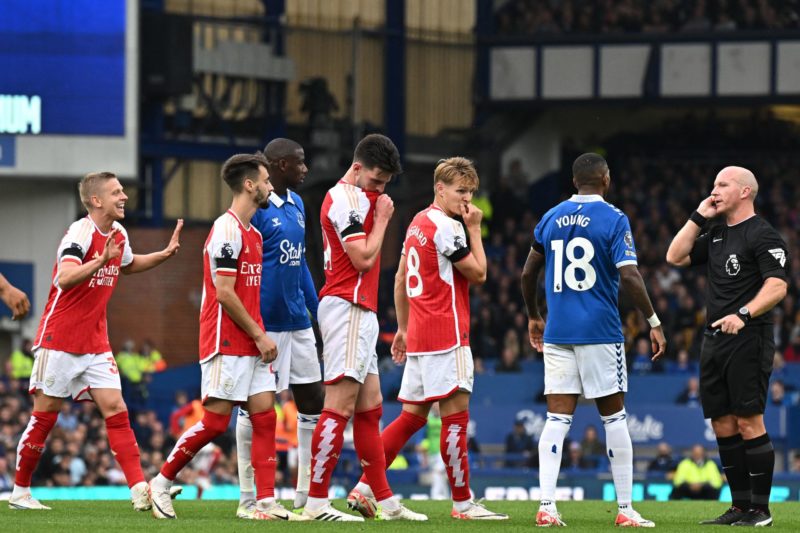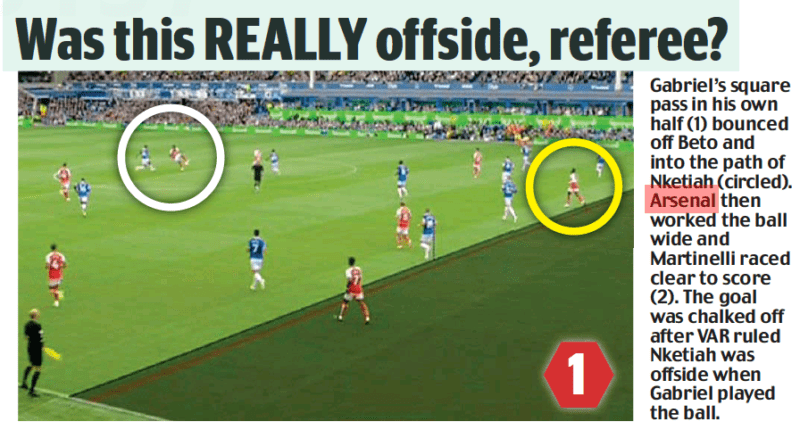In the ever-evolving world of football, where every decision is under the microscope, the laws of the game are becoming more a matter of pedantry than practicality.
The recent disallowed goal of Gabriel Martinelli at Goodison Park only emphasises the growing dissonance between the game’s spirit and its regulations.

For those who missed the action: A seemingly harmless square pass from Gabriel Magalhães in his own half aimed at Declan Rice was intercepted by Beto.
The ball’s trajectory took an unexpected bounce, flying a distance of 40 yards and landing near Eddie Nketiah.
Here’s the catch: Nketiah, though running away from the goal, was deemed to be fractionally offside. His pass to Fábio Vieira led to what could have been a picture-perfect goal by Martinelli.
However, the goal did not stand.
The point of contention wasn’t the referees’ decision, which, by the book, was apparently spot on. It was, instead, the very “book” itself that is the problem.

The rules specify that Beto’s interception, while undeniably deliberate, didn’t count as a “deliberate play” per the revised laws of the game. One wonders what he was trying to do if he wasn’t trying to play the ball.
So, instead of that unexpected deflection being just another unpredictable play that makes football the game it is, it became grounds for technical offside.
In The Guardian, Rob Smyth writes, “When the FA’s Ebenezer Cobb Morley introduced offside in 1863, it was to stop goalhanging, not to give pedants their ikigai.”
The term “ikigai” in Japanese culture refers to one’s reason for being, or something that gives life its purpose.
There’s an ironic observation to be made here that, for some, poring over the intricacies of football’s laws has become their ikigai.
Yet, for the vast majority who relish football’s raw, unfiltered drama, the question is simple: Is the current interpretation of the offside rule really serving the game’s best interests?
As Smyth notes, one can’t help but hark back to 1863 when the FA’s Ebenezer Cobb Morley first tabled the offside rule. The intention was clear – to prevent goalhanging, a situation where a player positions himself near the opponent’s goal waiting for the ball.
It was never conceived to be a tool for microscopic examination of every pass and deflection.
The Daily Mail, too, also questioned if this was ‘really’ offside.

While in the Telegraph, former referee Keith Hackett wrote, “Arsenal fans will not thank me for saying it, but the disallowing of Gabriel Martinell’s first-half “goal” was the right decision under the revised laws of the game.
“But those fans have every right to feel aggrieved because we have ended up with a situation that is far too grey.
“Strictly following the offside law, Beto was judged not to have played the ball deliberately, even though he was trying to block Gabriel’s pass, which meant Nketiah was offside. For it to be deemed a deliberate play, that defender must be in control of the ball or have the possibility to control it, and neither applied here. The fact Beto made a deliberate move towards the ball did not sway VAR.
“Deliberate play (excluding deliberate handball) is when a player has control of the ball with the possibility of passing to a team-mate, when the player gains possession or when they clear the ball. Confusing? You bet.”

Football, for most fans and players alike, is as much a game of passion as it is of skill. It thrives on the unexpected, the unforeseen twists that make each match a unique spectacle.
When rules become too nit-picky, it runs the risk of stripping away the game’s soul, turning it into a mere technical exercise.
Perhaps it’s time to revisit the drawing board, not to rewrite the rules but to ensure they uphold the spirit of the game.
After all, football’s charm lies in its unpredictability, and it’s essential that regulations, however well-intentioned, don’t stifle its very essence.
